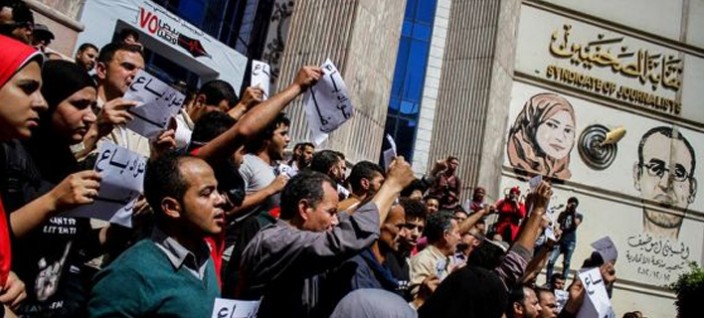As the current regime in Egypt asserts its control over more spheres of politics and society, it is realizing the importance of spreading military morals as an ideology for all aspects of life, especially media and culture production. In addition to using the security apparatuses, the regime is also using civilian institutions to initiate new forms of repression to replace previous security measures that were synonymous with military rule. A prominent example of these practices is the way the regime has chosen to control the media. The Supreme Council for Media Regulation (SCMR), established just a year ago, has asserted its authority outside former avenues of repression and censorship while seeking to maintain an appearance of independence. While the first year of the council’s work indicated that its main purpose should be to protect the regime from any criticism coming from media, the council’s recent activities have shown that it will parallel the ongoing militarization of state institutions by using entertainment to spread the military’s conception of morality as the ideology of the state.
In April 2017, President Abdel-Fattah El Sisi issued a decree establishing the SCMR and appointed the vocally pro-state journalist Makram Muhammad Ahmed as its chairman. The council’s official goals are to “protect” opinions, thoughts, and expression, and to “guarantee the independence of media.” However, since its establishment, the council’s main job has been criticizing and filing criminal complaints over not only expressions of opinion or thought opposing the regime, but even those of supporters who voice opinions that are not 100 percent in line with the regime’s rhetoric.
While Article 71 of the Egyptian Constitution states that there should be no imprisonment for crimes related to expression, Article 211 states that the SCMR should be an independent body that is responsible for regulating media and protecting its freedom. With the council’s establishment last year, the authority to control media outlets and punish criticism is shifting to the media council, with several incidents showing that the council’s general stance on freedom of expression is no different than other institutions, such as the Interior Ministry or the Public Prosecution. The council also has the right to demand that the Press Syndicate or television channels suspend journalists or even cancel their work permission.
On April 1, the council levied a fine of 150,000 Egyptian pounds (LE) against independent newspaper al-Masry al-Youm, forced it to apologize to the National Elections Authority (NEA), and referred it to the Press Syndicate for investigation. Al-Masry al-Youm had published a front-page story reporting on the state’s attempts to use fines and incentives to mobilize voters during the presidential election in March, prompting a complaint from the NEA. The head of the syndicate lauded the council’s decisions and praised the NEA’s decision to resort to the council rather than the prosecution or the courts. The former editor-in-chief of the newspaper—who was sacked after the incident—said that he respects the council’s decisions and is ready to be investigated by the syndicate.
In an interview on the satellite channel On TV, Ahmed, the chairman of the council, detailed what he described as “the professional mistakes” al-Masry al-Youm committed by publishing this news at a critical time in Egypt’s history. When the presenter challenged him, noting that a provincial governor said clearly that the government will allocate LE100,000 to solve the water problems of the village with the most turnout in the elections, Ahmed responded by saying that these incentives are given all over the world to encourage people to vote. He also stressed that Egypt is going through hard times and that the Muslim Brotherhood is claiming that nobody participated in the elections.
This incident—and several others like it—made clear that the purpose of establishing the SCMR was not to follow constitutional guidelines protecting the freedom of media nor to protect journalists from being prosecuted. Rather, it shows that it is adopting the same philosophy of intimidating and punishing journalists, but by employing different forms of punishments which may not include imprisonment.
However, a recent development showed that the SCMR should be playing a much bigger role than just silencing news media. Earlier this month, the council issued guidelines under the title “Drama Criteria” to all Egyptian television channels before Ramadan. The guidelines insist that both drama series and commercials must be reviewed before they are aired. It also stresses that the drama production must meet professional and moral codes and provide enough space for glorifying the heroic role of the armed forces and the police. In addition, they must not use profane language, feature poor social behaviors, or glorify criminals.
The regime will always adopt the state of exception discourse, stressing on the danger of terrorism or the critical times Egypt is witnessing. But these are not just some exceptional measures. The establishment and empowerment of the SCMR is evidence that the regime in Egypt has tightened its grip on all forms of governance. What is happening now is that the regime is trying to establish the military codes of ethics as the social reference of Egyptian society.
The militarization of the Egyptian society is now being attempted at an unprecedented scale. The process began with the military’s major presence in public life, then continued with the militarization of state institutions and the private sector. Now, military control over news and media is developing so as to provide an ideology that should be adopted by the Egyptian people. Students are chanting the military cadence at schools, television productions are either directly owned by military companies or regulated by them, and media personalities are spoon-fed what they are supposed to say. The SCMR will control the drama industry, in addition to media and news outlets, to guarantee that people only see what the regime wants them to see and hear what it wants them to hear.
